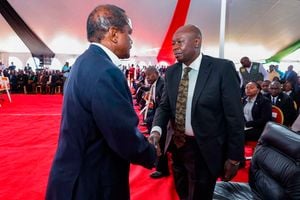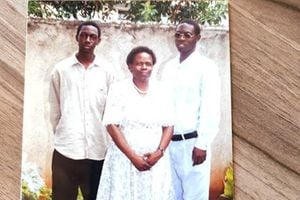Legal clinic: Think twice before spying on your cheating spouse

A private detective spying on cheating spouse.
Hi Wakili
There is a lot of buzz on divorce and sorry state of marriages in Kenya. I was surprised to learn that not all evidence of cheating is admissible in divorce cases, for instance, evidence obtained through spying. Please share your thoughts on this issue.
Dear Sir,
A marriage irrespective of its origin and support system must be known to exist. The existence is often described by social, cultural or religious tenets of any society. Such description has allowed society to coin expressions like widows, widowers, divorcees, spinsters and bachelors. Section 3 of the Marriage Act defines marriage as the union of a man and woman whether in a monogamous or polygamous union and registered according to the tenets set by the Act, in pursuance to Article 45 (2) of the Constitution.
It is assumed that the architecture and substance of marriage creates and sustains happiness between two or more people, willing to set up a union whose harmony fulfils certain defined desires, select emotional spaces and provides companionship that is structured as a family set up. Therefore, it is an institution defined, subsisted and terminated by law, notwithstanding that it is recognised and celebrated in diverse religious and cultural ways.
On the part of termination, section 66 (2) of the Marriage Act places the burden of marriage dissolution on parties to prove that certain tenets or formalities are violated in a way that makes the union significantly untenable. However, in 2020 Justice Reuben Nyakundi while sitting and adjudicating a family matter in the Mombasa High Court, ruled that it was not only dangerous, but largely unfair to coerce unwilling parties to stay together in a state of marriage, simply because grounds of adultery, cruelty, exceptional depravity, desertion and irretrievable breakdown of the union could not be ascertained.
The Daily Nation on January 18, 2023, by a study of government, informed readers on the prevalence of extra-marital affairs in the country, where most men were found to have an average of seven sexually intimate partners, while women had two. In this regard, couples in an attempt to find and prove fault in the paling trust experienced in their marriages have invested in many different mechanisms of trying to support their suspicions. One of the most common yet discreet approaches is employment of private investigators, instructed to collect all forms of information and data to give face and form to adultery and loss of fidelity in a union. Private investigation in this context includes and not limited to the use of cameras, video and sound recorders amongst others that inconspicuously collects audio and visionary information without the knowledge of the person being investigated. In the language of citizens, it is known as spying.
Although Section 107 of the Evidence Act is categorical that the person who alleges must also proof the allegation, there is limitation created by the Data Protection Act (2019) in fulfilment of the Constitution, especially Article 28, 31 and 50 (4). Justice Anthony Mrima in the matter of RC vs. KKR arrived at such conclusion, he stated the following: “a declaration hereby issues that the Respondent’s action of secretly installing a CCTV camera in the parties’ son’s bedroom which room the Petitioner currently occupies, the Respondent’s actions of secretly and variously installing voice recorders with a view to record the Petitioner’s private conversations, the Respondent’s action of secretly using a private investigator and the Respondent’s actions of accessing the Petitioner’s email and social media accounts without the consent of the Petitioner all offend Articles 28, 31 and 50(4) of the Constitution.”
Further, it should be known that the Evidence Act places a higher premium regarding integrity of any electronically procured evidence. Section 78 (3) of the Evidence Act allows the court to interrogate the manner in which electronic and digital evidence was generated, stored and communicated. Moreover, the court may seek to understand the reliability of the manner in which the integrity of the electronic and digital evidence was maintained: and the manner in which the originator of the electronic and digital evidence was identified. Couples therefore need to know of the higher degree of scrutiny placed on electronically and digitally procured evidence.
Lastly, it is provided under Section 55 of Part X of the Evidence Act, that in any civil matter, no person’s character can be imported into the court of law to impute the integrity of an allegation. It is only imputable if such character manifests itself in the facts that the court admits as acceptable evidence before it. In submission to the standards set by and in law, it is important to remember that every allegation made must be evidenced by the originator, except where circumstances demand the opposite to apply, as described at Section 111 (1) of the Evidence Act. Such standards are always subject to Article 50 (4) of the Constitution, which declares and affirms that evidence obtained in a manner that violates any right or fundamental freedom in the Bill of Rights shall be excluded if the admission of that evidence would render the trial unfair, or would otherwise be detrimental to the administration of justice. Couples beware, that the institution of marriage does not decapitate the individuality of a person, and their rights are therefore a subject the constitution defines, protects and promotes at any given time and circumstance.
Eric Mukoya has over 17 years’ experience working in the social justice sector. He’s the executive director of Undugu Society of Kenya. Legal query? Email [email protected]





